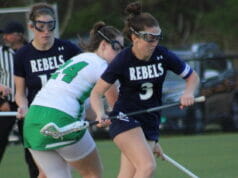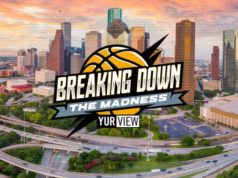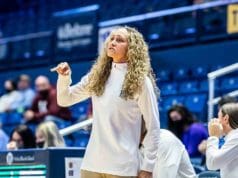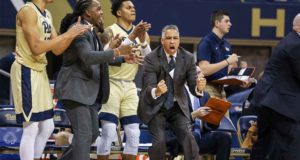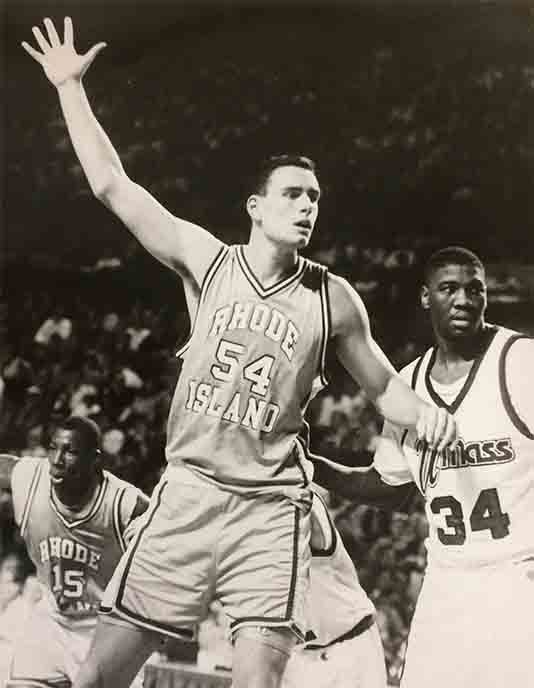
It’s nice to catch up with former University of Rhode Island Rams basketball standouts every so often — particularly those who enjoyed their collegiate experiences personally and now call the Ocean State home. Newly minted U.S. Citizen Michael Andersen fits the bill.
After helping the Rams to an NCAA Tournament berth in 1996-97, the Denmark native went on to play professionally for nearly a decade at a variety of stops, winning two championships in Poland along the way.
Since settling back in Rhode Island with his wife Blakeley, son Ryder, and daughter River, Andersen leads a successful IT company and makes familiar cameos in the Ryan Center during hoop season as he follows his alma mater:
Chris DiSano: Your playing days back at Rhode Island (1993-97), you were on a team that cycled from veteran-laden to youthful and then was building again as a unit. What do you remember most about the evolution of that team?
Michael Andersen: My first year there were a lot of seniors [Abdul Fox, Kyle Ivey-Jones, others], but my sophomore year was when Cuttino Mobley and Tyson showed up on campus. We were young, but that’s when we really started to build up to what happened in 1997 when we went to the NCAAs. And they went on the next year to go deeper in the tournament.
It was probably around beginning of my junior year that I realized we were going to be really good the next year. Every day we just got better and started beating teams that we had no chance of beating before, like Temple and others we’d struggled to beat. Then obviously beating Providence was huge too. We had a really good group of kids, young men, at the time — my junior and senior year.
CD: You grew leaps and bounds in your time at Rhode Island, with a significant jump between freshman and sophomore seasons as many do. For some of URI’s current young big men, what advice do you have for them?
MA: Put as much time in as you can by yourself. Don’t just do the team stuff, do as much individual work as possible when you have time. I said to my wife a month ago, one thing I could’ve done more was party less and work out more [laughs]. But you don’t see it then.
I got much better because I would spend my time down at the field house working out by myself or working out with David Bialski – who’s still one of my good friends. He and I would play one on one. I got so much better playing against him every day, just doing post moves. Back then, 7-footers shooting threes didn’t exist. So I committed to working on individual post moves.

MA: I remember missing the follow-up shot of Tyson’s last shot in regular time to win it and I still think about that. If that had gone in we would’ve moved on. We ended up going into overtime and losing but it was a great experience and prepared me for what would happen the next year playing in the European Championships. But it was awesome.
Flying down on the chartered Delta flight, I remember sitting there thinking , “I’m not in normal coach seating.” That was great for me with my legs [laughs]. A great atmosphere with all the people that were supporting us coming down. I’ll always remember that.
CD: In addition to David, do you still keep in touch with some of the other guys from those years and teams?
MA: Mostly David, but Facebook helps. I see Chris Wosencroft once in a while. Saw Preston Murphy a couple weeks ago as his son was at the same event my son was at, and I’m most likely to see guys that way.
CD: You went on to have a decade or so professional career at a number of stops and had some great success. What’s your fondest professional moment?
MA: Winning two professional championships in Poland was awesome; it’s always fun to win. But my first year out of college I played for a team in Greece called AEK. We went to the European Championships in Barcelona.
We lost in the final, but when you go from playing in college to this environment where there are flares, people singing nonstop during the game and people going absolutely crazy… it’s something. I tell people stories and they don’t believe it, but it’s so outrageously crazy. Once you get used to it, you really enjoy it. It gets you pumped up for every game because the fans are insane.
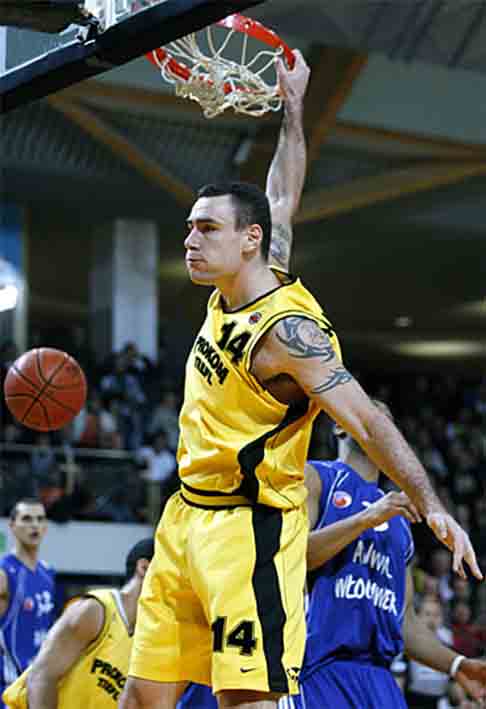
CD: You spent time in a number of different European cities during your playing days. What was your favorite and why?
MA: I have a couple favorites actually. Athens is great for a number of reasons. It’s a big city, great food. At the time I was younger and I had a whole different attitude about going out and having fun after games. Naples was also awesome. Terrific food, people there are super passionate… I’ve made so many friends from playing so many years in those different cities.
When young guys approach me now and ask if they should go I always say “Yes, go, but make sure you go to the right teams and make sure you research their history of paying guys on time because that can be a problem.”
CD: What are you up to these days?
MA: After I retired from basketball I tried coaching for a little bit. But I quickly found out that there were going to be so many steps to becoming a head coach at the D-1 level. So I sat down and asked myself what else I knew besides basketball? And before I was a jock I was a geek. So I went back to being a geek.
I knew computers, researched how to be a successful business owner and there was a lot of literature about going into franchise to succeed. I looked into computer/IT franchise and found one based out of Florida called Fast Techs. I was a franchisee for four years. Over time and due to some conditions, it made sense to move away from the franchise and I did so with the help of my lawyers.
I changed the name to Onsite Techs (“OST”). We did a lot of on site work back then but now it’s mostly remote. Most of the work we do is preventative maintenance and monitoring and we can help small businesses right from our offices remotely. We focus on small businesses and it’s been going really well.
CD: You recently became a U.S. citizen. How special is citizenship to you and can you give us a glimpse into your perspective on the process?
MA: It means everything to me. It means I can finally vote. I can participate in everything I couldn’t do before as a green card holder. When I came to the states I was 19 years old and even when playing professionally, I was always here in the summers — I always came back. So other than when playing basketball and being there, my whole adult life has been in the United States. Even before that I always dreamed about it.
Finally being a citizen is a dream come true, since I laid in front of the television (in Denmark) and watched Dallas and Dynasty and knew I wanted to live over there. I always told my kids I was going to become a citizen and now I am… and I’m super proud to be a U.S. citizen.
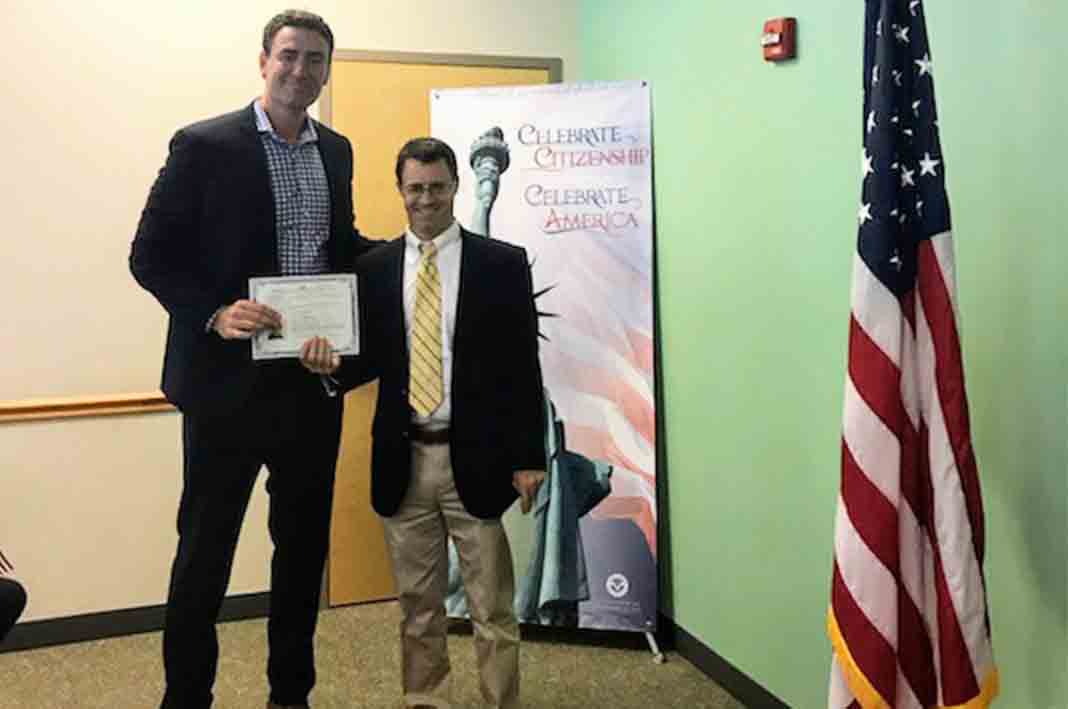
When I decided I wanted to go through the process, my green card was going to run out. I could either renew it or start the citizenship process. It just so happened that a couple of years ago Denmark changed the rule on dual citizenship to allow it. That was important because I grew up in Denmark and I was torn on whether to give that up, but now there was nothing stopping me.
The same law firm that helped me get a green card many years ago helped me through the process of filling out a comprehensive form, then came background checks, then bio-metrics and screening, then an interview to answer a series of questions. A couple weeks after that, I received a letter saying I should be at a place in Johnston, Rhode Island for my swearing in. And as of September 5th, 2019, I became a U.S. Citizen.
CD: We just walked through your motivation to become a U.S. Citizen and feelings about it. But you and I both see the polarized game (particularly on social media) when it comes to political beliefs. How has your path to citizenship enlightened you and given you perspective when you see these types of conversations?
MA: It’s kind of funny. To me, before I could even vote I would ask myself when seeing these things, “If you’re not happy about it, then why don’t you go out and do something about it?” It’s so easy to get on social media and say “You’re wrong, I’m right.” If you don’t like what you see or disagree with the person elected by the rules, then get out there and make sure people hear the message in a constructive way. And if you didn’t vote and then complain, I have no time for that – regardless of the party you affiliate with. Get out and do something for your community to help make it a better place. That’s democracy and we should be very happy we have a say.
CD: Let’s pivot to your son who is 15 years old and playing nearby. Tell us what he is up to on the court.
MA: Sure, Ryder was at North Kingstown and just recently transferred to a Connecticut boarding school called The Rectory in Pomfret. He’s a five day boarder there [reclassified as a freshman], but he was at NK last year when they won the state championship. He’s 6-9 now, he has some talent but is still young and has lot of growth years to continue getting better. He plays for an AAU team out of Boston called Expressions Elite as I believe Jared Terrell did. So he’s in the whole AAU, prep school circuit right now.
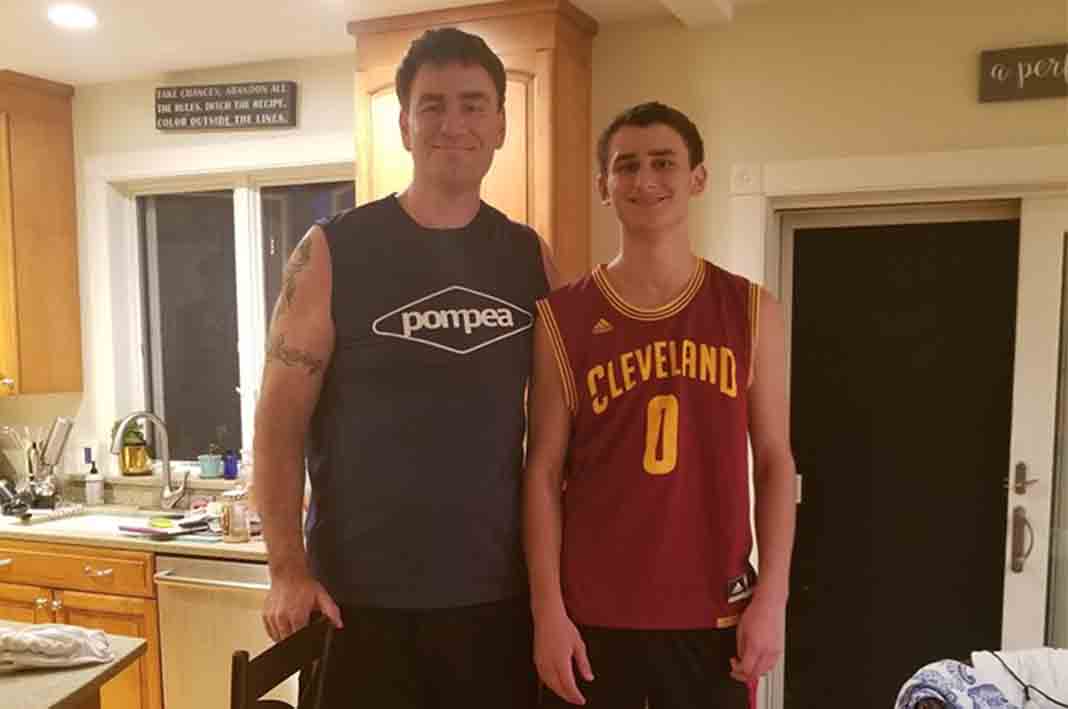
As his Dad, I’m trying to let him know it’s not about how much you play, but about fundamentals and skills at this point. If you’re just playing in AAU tournaments on the weekends, you’ll probably get more development and benefit from spending the time working out on individual skill development at his age. Once you get to junior or senior years, then the exposure at tournaments and camps is terrific. But at freshman and sophomore I believe individual skill development is way more important.
CD: I’m sure he has designs on playing college basketball. Where is he at in terms of schools of interest?
MA: He’s been saying UCLA for so long it’s become a joke, but basically it’s anywhere warm. And I say, “What about URI?” He says, “Yeah, them too, maybe but I want to get away from you though.” And I jokingly told him that he can’t go to PC. He’s been to camp there though.
CD: You’ve probably seen the schedule for URI this year, it’s a challenging one. You plan on getting to the Ryan Center this year?
MA: Yes, I like to get over four or five times a year. Whatever fits into the schedule, which is more challenging now with my son playing on the weekends. And if I can make the PC game in person I enjoy that.


